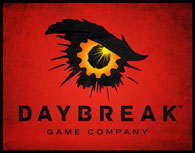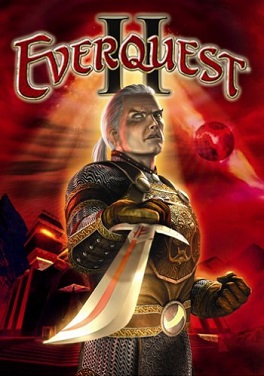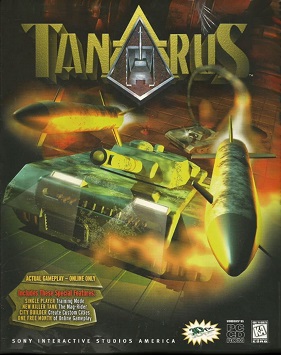
EverQuest is a 3D fantasy-themed massively multiplayer online role-playing game (MMORPG) originally developed by Verant Interactive and 989 Studios for Windows. It was released by Sony Online Entertainment in March 1999 in North America, and by Ubisoft in Europe in April 2000. A dedicated version for Mac OS X was released in June 2003, which operated for ten years before being shut down in November 2013. In June 2000, Verant Interactive was absorbed into Sony Online Entertainment, who took over full development and publishing duties of the title. Later, in February 2015, SOE's parent corporation, Sony Computer Entertainment, sold the studio to investment company Columbus Nova and it was rebranded as Daybreak Game Company, which continues to develop and publish EverQuest.

Penny Arcade is a webcomic focused on video games and video game culture, written by Jerry Holkins and illustrated by Mike Krahulik. The comic debuted in 1998 on the website loonygames.com. Since then, Holkins and Krahulik have established their own site, which is typically updated with a new comic strip each Monday, Wednesday, and Friday. The comics are accompanied by regular updates on the site's blog.

Star Wars Galaxies (Galaxies) was a Star Wars- themed massively multiplayer online role-playing game (MMORPG) for Microsoft Windows, developed by Sony Online Entertainment (SOE) and published by LucasArts.
DikuMUD is a multiplayer text-based role-playing game, which is a type of multi-user domain (MUD). It was written in 1990 and 1991 by Sebastian Hammer, Tom Madsen, Katja Nyboe, Michael Seifert, and Hans Henrik Stærfeldt at DIKU —the department of computer science at the University of Copenhagen in Copenhagen, Denmark.

Daybreak Game Company LLC is an American video game developer based in San Diego. The company was founded in December 1997 as Sony Online Entertainment, a subsidiary of Sony Computer Entertainment, but was spun off to an independent investor in February 2015 and renamed Daybreak Game Company. On December 1, 2020, Daybreak Game Company entered into an agreement to be acquired by Enad Global 7.
The Shining series is a name of role-playing video games published by Sega, who owns the property. The first game, Shining in the Darkness, was a first-person dungeon crawler with randomly encountered, turn-based battles. The next game released in the series was Shining Force, which was a turn-based strategy style tactical role-playing game with battle scenes acted out with sprites. Other directions include Shining Soul, a dungeon crawl action role-playing game with roguelike elements, and a number of traditional Japanese role-playing games. Shining Resonance Refrain was released on PlayStation 4, Xbox One, Steam PC and Nintendo Switch worldwide across 2018.

Brad McQuaid was an American video game designer who was the key designer of EverQuest, a highly successful massively multiplayer online role-playing game (MMORPG) released in 1999. He later co-founded Sigil Games Online where he served as CEO and Executive Producer of Vanguard: Saga of Heroes until Sony Online Entertainment's acquisition of Sigil Games Online in May 2007. On July 6, 2012, SOE announced the re-hiring of McQuaid to continue his work on Vanguard. On January 13, 2014, McQuaid announced his role of Chief Creative Officer at Visionary Realms, Inc. for the PC MMORPG, Pantheon: Rise of the Fallen.

EverQuest: The Ruins of Kunark is the first expansion to EverQuest, a massively multiplayer online role-playing game (MMORPG), released on April 14, 2000. It introduced a new land area to the game, the continent of Kunark, which had been previously unexplored. Through a mix of in-game events and fiction published on the web by Verant Interactive, the storyline of the discovery of Kunark was established.

EverQuest II is a 3D fantasy massively multiplayer online role-playing game (MMORPG) originally developed and published by Sony Online Entertainment for Microsoft Windows PCs and released in November 2004. It is the sequel to the original EverQuest, released five years earlier, and features updated graphics and more streamlined gameplay compared to the previous entry, as well as an abundance of voice acting with contributions from actors such as Christopher Lee and Heather Graham. In February 2015, Sony Online Entertainment's parent corporation Sony Computer Entertainment sold it to investment company Inception Acquisitions, where it continues to develop and publish the game under its new name, Daybreak Game Company.

Raphael "Raph" Koster is an American entrepreneur, game designer, and author of A Theory of Fun for Game Design. Koster is widely recognized for his work as the lead designer of Ultima Online and the creative director behind Star Wars Galaxies. From 2006 until 2013 he worked as the founder and president of Metaplace producing a Facebook game platform.

Vanguard: Saga of Heroes was a high fantasy-themed massively multiplayer online role-playing game (MMORPG) developed by Sigil Games Online and published by Sony Online Entertainment (SOE). The game was released on January 30, 2007 and initially sold around 242,000 copies, while the number of active subscriptions was estimated to be around 130,000, to drop in the next months to about 40,000. In May 2007, Sony Online Entertainment acquired key assets from Sigil Games Online, including all rights to Vanguard.
A griefer or bad-faith player is a player in a multiplayer video game who deliberately and intentionally irritates, annoys or trolls other players within the game. Griefing is often accomplished by destroying things constructed by other players or stealing items. A griefer derives pleasure from the act of annoying other users, and as such, is a nuisance in online gaming communities.

Tanarus was a 1997 online-only multiplayer first-person shooter video game developed by Verant Interactive and published by Sony Interactive Studios America for Windows. It is unusual for not being released on any PlayStation console, despite Sony Computer Entertainment owning the rights to the game. Originally titled Armorgeddon, Verant was forced to change the name when another game with that name was discovered. It was released in late 1997. Verant would later gain recognition by developing EverQuest for Sony Online Entertainment. The game was included in Sony Online Entertainment's Station Exchange program in 2007, and shut down on June 10, 2010.

John Smedley is an American business executive. He is the general manager at Amazon Games. He was the former president of Daybreak Game Company, which changed its name from Sony Online Entertainment in 2015.
GU Comics is a single panel webcomic written, drawn, and colored by William "Woody" Hearn. Established July 10, 2000 and launched August 15, 2000, GU is published, free, five times a week on its own web site. The comic focuses on a single video game such as World of Warcraft; but, it also comments on gaming industry and community news, often lampooning gamers in general through the adventures of Hearn and his fictional roommate, Ted, and occasionally parodies contemporary social, political, and personal issues related to the online and general video game world. In recent months Hearn has focused primarily on writing comics revolving around various pen-and-paper role playing games; it is unclear if Hearns actually takes part in these games or if he simply finds humor in D&D sourcebooks over PC MMO games.
The history of massively multiplayer online games spans over thirty years and hundreds of massively multiplayer online games (MMOG) titles. The origin and influence on MMO games stems from MUDs, Dungeons & Dragons (D&D) and earlier social games.

Legends of Norrath was an online digital collectible card game by Sony Online Entertainment. Legends of Norrath is based on the massively multiplayer online role-playing games EverQuest and EverQuest II. Legends Of Norrath was playable from within either of the two games, or via a stand-alone client.

EverQuest Next was a planned massively multiplayer online role-playing game (MMORPG), meant to be the successor to EverQuest, EverQuest Online Adventures and EverQuest II. The game was in development by the Daybreak Game Company, but the project was terminated in 2016.

Firefall was a science fiction free-to-play massive multiplayer online open world shooter video game developed and released by Red 5 Studios in 2014. Officially announced in 2010, the game entered closed beta in 2011 and open beta in 2013. It was the first and only game to be developed by Red 5 Studios, combining elements from both the shooter genre and some role-playing aspects from the massive multiplayer online genre. Firefall was shut down in 2017.

PlanetSide 2 is a free-to-play massively multiplayer online first-person shooter (MMOFPS) game developed by Toadman Interactive. The game supports battles with thousands of players and incorporates modern first-person shooter mechanics. Six infantry classes and multiple vehicles available to players, allowing them to interact in combined arms warfare on the battlefield. PlanetSide 2 is a reimagining of PlanetSide and chronicles the efforts of the same three factions in their fight for control of the alien planet Auraxis.














